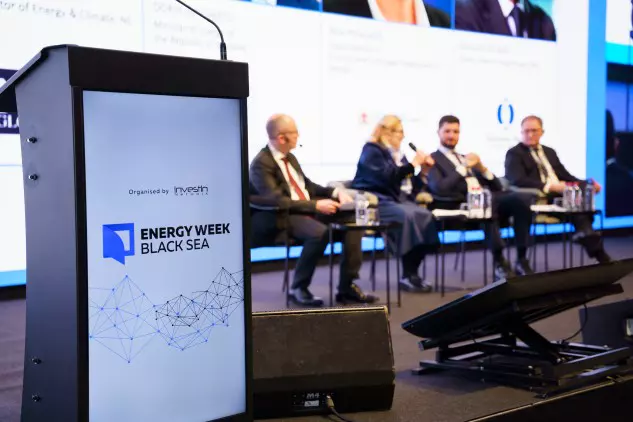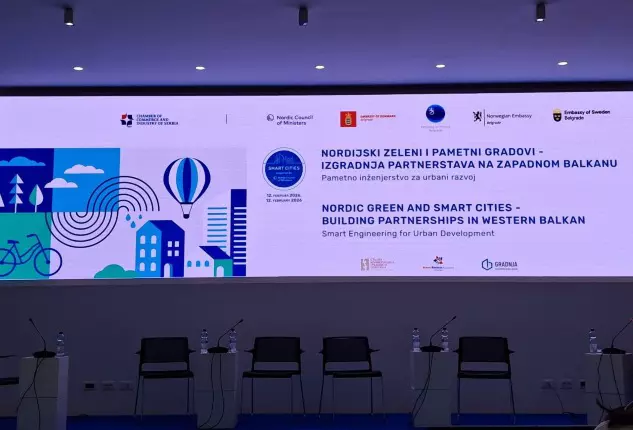On January 30 and 31, 2025, the capital of Bosnia and Herzegovina hosted the Sarajevo Energy Forum 2025. This third edition of the forum brought together representatives from governments, energy companies, sustainable development experts, academia, and international institutions. As part of SEF 2025, a Renewable Energy Fair was organized, showcasing the latest achievements in this field from Bosnia and Herzegovina, the region, and around the world.
SEF serves as a platform for discussing new technologies, policies, and innovations that will shape the future of sustainable energy systems. During the two-day forum, participants had the opportunity to engage in panels, presentations, and workshops on the following key topics:
1. Energy storage and stable energy sales contracts. The development of energy storage has become crucial for the stability of energy systems, ensuring a continuous supply from renewable sources such as solar and wind power. Experts discussed cutting-edge storage technologies, including lithium-ion and advanced battery systems, and how long-term energy sales contracts can ensure market predictability and stability. The session also explored the challenges and opportunities in aligning the interests of producers, distributors, and consumers.
2. Energy security and independence for local communities and the economy. The forum addressed strategies for achieving greater energy independence and security in local communities and the business sector through decentralized energy sources. Discussions included solutions such as microgrids, local renewable energy sources, and new approaches to energy democratization. Special attention was given to the role of local governments and businesses in strengthening energy infrastructure, reducing dependence on energy imports, and increasing resilience to external energy shocks.

3. AI and innovation in demand prediction, generation, distribution, and energy trading. The use of artificial intelligence (AI) and machine learning is increasingly important in the planning and management of energy systems. This session focused on how AI technologies can improve energy demand prediction, optimize resource allocation, reduce losses, and adjust production and prices based on fluctuations in demand and current capacity. Participants also explored real-world examples of AI applications in smart grids and the integration of these technologies into energy systems to enhance efficiency and reduce costs.
4. Agrosolar and the dual use of agricultural land. Combining solar panels with agricultural land is an innovative approach that allows for the dual use of land – for both food and energy production. This model, known as agrosolar, enables farmers to generate additional income through solar energy production without compromising agricultural output. The panel discussed successful examples of these projects, the technical challenges involved, and the potential for growth in the region.
5. Grid availability, smart meters, gas connections, solar, wind, biomass, nuclear, and green hydrogen in regional plans. Regional energy plans are increasingly focusing on the diversification of energy sources, including natural gas, solar and wind power, biomass, and green hydrogen. The discussion covered the current and future availability of these sources, their integration into existing energy networks, and the technical, economic, and political challenges facing the region. Participants had the opportunity to learn about the plans being developed to enhance regional energy resilience and sustainability.
6. Financing renewable energy projects, ESG standards, energy efficiency, electromobility, CBAM, and education for energy and development transformation. Financing renewable energy projects is a key challenge for many countries and companies in the region. This panel explored various financing models, including international funds, private equity, and public-private partnerships. Special attention was given to ESG (Environmental, Social, Governance) standards, electromobility, the Carbon Border Adjustment Mechanism (CBAM), and education and training as essential components of the transformation of the energy sector.
Sarajevo Energy Forum 2025 also formulated conclusions in the following thematic fields:
1. Accelerating the energy transition. Investment in renewable energy sources must be increased to ensure the stability and long-term sustainability of the energy sector in the region.
2. Enhancing regional cooperation. Strengthening partnerships among the Western Balkan countries is crucial to achieving common goals in energy security and decarbonization.
3. Supporting innovation and digitalization. Digital technologies and smart energy solutions are essential for optimizing consumption and improving efficiency.
4. The importance of policies and regulations. It is necessary to align legal frameworks with European standards to facilitate faster market integration and the development of sustainable energy projects.
5. Community involvement and education. Raising awareness among citizens and educating future generations of experts are key factors for the successful implementation of green solutions.
The forum concluded with the announcement of Electric and Hybrid Vehicle Week (EV WEEK 2025), which will be held from April 17 to 18, 2025, and the Sarajevo Energy Forum 2026, which will once again feature the Energy Exhibitors Fair, scheduled for January 28-30, 2026.


